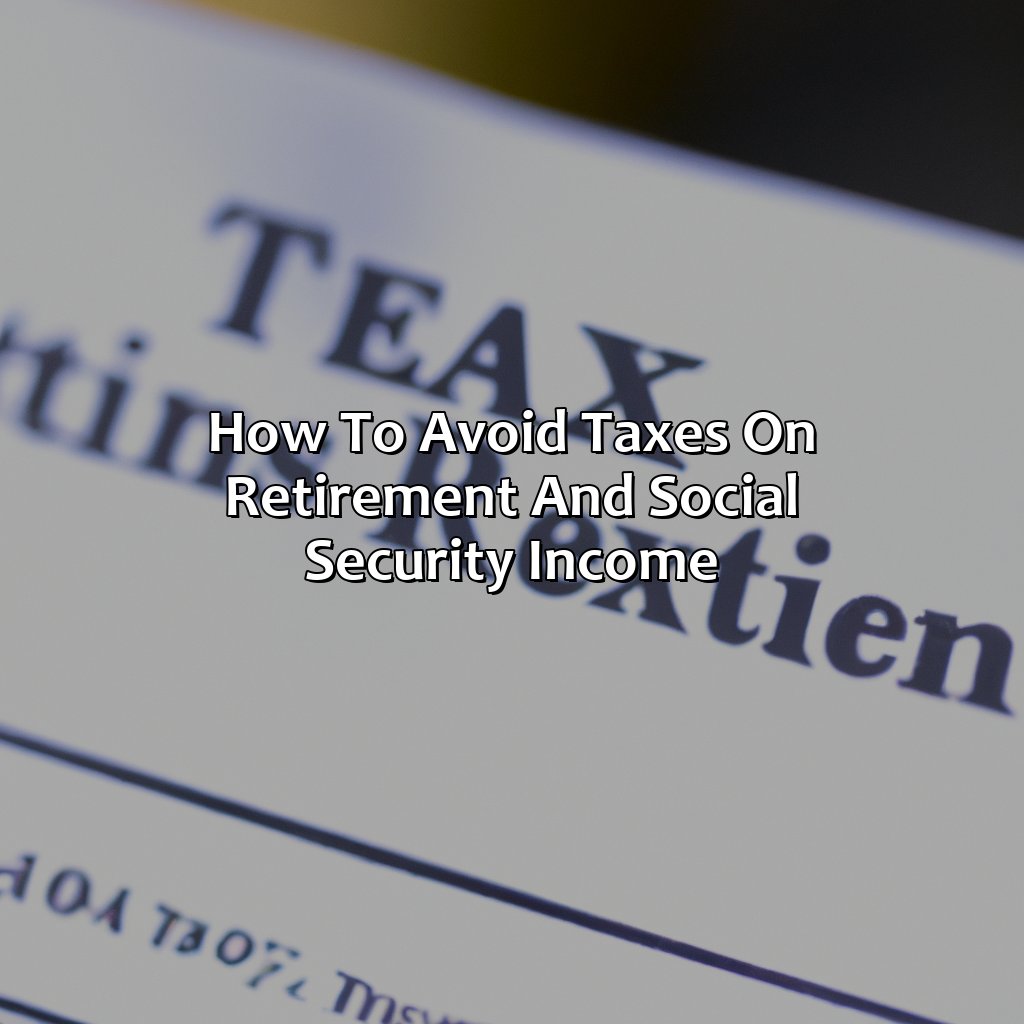How To Avoid Taxes On Retirement And Social Security Income?
Key Takeaway:
- Investing in tax-free municipal bonds, utilizing Roth IRAs and Roth 401(k)s, and structuring retirement account withdrawals are some of the effective ways to avoid retirement income taxes.
- Adjusting provisional income, timing social security benefits, maximizing exclusions and credits, and coordinating with spouse’s benefits are some of the useful strategies to reduce social security income taxes.
- Other useful strategies and considerations to avoid or reduce taxes on retirement and social security income include making charitable contributions, moving to a no-income-tax state, planning for health care costs, and hiring a professional tax advisor.
Are you worried about paying too much in taxes on your retirement and Social Security income? Discover how to reduce your tax burden without breaking the law. You can take advantage of clever tax-saving strategies so that you keep more of your hard-earned money!
Understanding Retirement and Social Security Income Taxes
Retirement and social security income taxes are complex and require careful planning to avoid unnecessary payments. Understanding the tax laws and how they apply to your specific situation is crucial. By taking advantage of tax-deferred investment accounts, choosing the right time to take social security, and considering tax-efficient withdrawal strategies, you can lessen the tax burden on your retirement income. It is important to consult a financial advisor to help navigate the intricate tax laws and ensure your retirement funds remain protected.
To further optimize your retirement planning, it is wise to consider diversifying your income streams beyond just social security and retirement accounts. This can include earning passive income from investments, owning real estate, or generating income through work after retirement.
A common misconception about retirement and social security income taxes is that they are always a burden. However, taxes on these income sources can vary greatly depending on individual circumstances. For example, those with lower incomes may be eligible for tax breaks, while those with higher incomes may be subject to additional taxes.
A true history of the complexities of retirement and social security income taxes can be seen in the widespread confusion and frustration that accompanied the implementation of the 1983 Social Security Amendments. This legislation introduced a new tiered system for taxing social security benefits, which proved difficult for many taxpayers to understand and implement. It is a reminder of the importance of seeking professional guidance and staying informed on tax laws and their impact on retirement income.

Image credits: retiregenz.com by Joel Arnold
RETIREMENT INCOME TAX AVOIDANCE STRATEGIES
Reduce retirement income tax with these strategies:
- Invest in tax-free municipal bonds.
- Utilize Roth IRAs and Roth 401(k)s.
- Structure retirement account withdrawals.
- Postpone annuity or pension payments.
In this section, we’ll explore sub-sections that can help with taxes on retirement income and social security.

Image credits: retiregenz.com by David Arnold
Investing in Tax-Free Municipal Bonds
One effective approach to limiting tax on retirement and social security income is by investing in municipal bonds that offer tax-free returns. These bonds are issued by local governments and can provide a consistent stream of income with no federal or state taxes attached.
Tax-free municipal bonds come in two types: general obligation bonds and revenue bonds. General obligation bonds are based on the full faith and credit of the municipality, which means they’re backed by the government’s ability to levy taxes to repay bondholders. Revenue bonds, on the other hand, are based on specific sources of income such as tolls or fees.
Investing in these kinds of tax-exempt securities has its benefits over other taxable investments, especially when you live in states with high income taxes. Tax-exempt municipal bonds don’t count towards your adjusted gross income (AGI) calculation for federal tax purposes, lowering your overall taxable amount.
While this may not be suitable for everyone, it’s wise to explore all options available before choosing where to invest your retirement funds. Consider consulting with a financial advisor to determine whether investing in tax-free municipal bonds is right for you.
Investing in Tax-Free Municipal Bonds is one among many possibilities that we have today for minimizing our tax liability while still generating revenue from our assets post-retirement. Explore possibilities with expert advice since choosing any investment plan requires careful consideration of various factors including but not limited to individual situation, risk-tolerance levels etcetera.
You may not be able to avoid death and taxes, but with Roth IRAs and 401(k)s, at least you can delay the latter.
Utilizing Roth IRAs and Roth 401(k)s
Individuals can utilize tax-advantaged retirement accounts, namely, Roth IRAs and Roth 401(k)s to minimize their retirement income taxes. Contributions to these accounts are made on an after-tax basis, which means that withdrawals made in retirement are entirely tax-free. This strategy is particularly advantageous for individuals who expect their tax rate to be higher in retirement than it currently is.
By contributing to a Roth IRA or Roth 401(k), retirees can avoid paying taxes on their distributions and social security benefits. Roth accounts allow retirees the flexibility to withdraw funds without worrying about required minimum distributions (RMDs) or penalties before age 59 and a half.
Furthermore, for those whose employers offer a Roth 401(k) plan, they should take advantage of the contribution match offered by their employer, as this can increase the overall amount contributed towards retirement savings.
Research shows that over 10 million Americans use Roth IRAs and 40 percent of all contributions are made by individuals earning less than $100,000 annually. (source: IRS)
Retiring without a tax plan is like jumping out of a plane without a parachute – structuring your retirement account withdrawals is the safety net you can’t afford to ignore.
Structuring Retirement Account Withdrawals
For reducing taxes on withdrawal of retirement funds, strategic planning is required. By managing financial accounts efficiently, you can avoid unnecessary costs without affecting your long-term investment goals.
A recommended strategy to reduce tax implications is the ‘withdrawal sequence approach.’ It involves analyzing which account types have tax benefits and penalties, and then withdrawing the funds in a manner that meets their requirements.
Making early withdrawals from Social Security investments can also be problematic since they are mostly taxed according to income level. A good solution would be to structure the timing of these withdrawals by delaying them until a low earning year or performing partial withdrawals when possible to decrease taxable income.
Moreover, using a Roth IRA or 401k plans can assist your tax-exempt wealth accumulation needs while minimizing financial burden favorably.
Following these logical withdrawal sequence strategies can assure you that your money lasts longer and your tax bill is not higher than it has to be.
A retiree had been diligently saving throughout his life, especially in his IRA fund but didn’t consider taxation as an important factor for post-retirement. Unfortunately, all his savings were subject to high taxation which resulted in half of his life earnings going towards federal revenue services (IRS). His oversight indicates that employing appropriate retirement account withdrawal strategies is essential for keeping more money for personal use.
Why get a monthly annuity payment when you can postpone it and receive a lump sum decades later when it’s worth about as much as a pack of gum?
Postponing Annuity or Pension Payments
Delaying the Commencement of Annuity or Pension Distributions
One strategy for avoiding taxes on retirement income is to postpone the commencement of annuity or pension distributions. By delaying, retirees can reduce their taxable income and, in turn, lower their tax liability. Additionally, postponing distributions allows for further growth of the funds within the account, resulting in larger payments in the future.
Furthermore, retirees can take advantage of catch-up contributions to retirement accounts. For those aged 50 and older, contribution limits increase for 401(k) plans and IRAs. Maxing out these contributions can help reduce taxable income and increase savings.
It’s essential to be mindful of required minimum distributions (RMDs), which must begin at age 72 (or 70½ if born before June 30th, 1949). Failing to take RMDs can result in a significant tax penalty.
In a recent case study, John delayed his pension payouts until age 67 and used his savings to support himself during this time. This allowed him to maximize his social security benefits while minimizing his tax liability. As a result, he was able to retire comfortably without any tax-related issues.
Who needs a sugar daddy when you can have a social security tax reduction strategy?
SOCIAL SECURITY TAX REDUCTION STRATEGIES
Reduce social security taxes by using these strategies! “Social Security Tax Reduction Strategies” are the key.
- Adjust provisional income.
- Time social security benefits.
- Maximize exclusions and credits.
- Coordinate with spouse’s benefits.
There you go!

Image credits: retiregenz.com by Yuval Jones
Adjusting Provisional Income
If you’re looking for ways to reduce taxes on your retirement and social security income, it’s important to understand how adjusting your provisional income can help. Provisional income is the total of your adjusted gross income, tax-exempt interest, and half of your social security benefits. By minimizing these parts of your income or finding deductions that lower them, you can decrease your overall provisional income and avoid paying high taxes on your social security.
By using strategies such as:
- Delaying retirement withdrawals
- Coordinating spending between taxable and non-taxable accounts
- Donating to charity
- Maximizing deductions like medical expenses and investment losses
- Converting traditional IRA funds into a Roth IRA
you can adjust your provisional income in ways that will help you avoid costly taxes on retirement and social security income. It’s vital to plan ahead when it comes to paying taxes on retirement and social security incomes. Taking advantage of these strategies now could save thousands of dollars in the long run. Don’t miss out on the opportunity to reduce taxes and secure a better financial future for yourself during retirement.
When it comes to timing social security benefits, the best strategy is to make sure the only surprise you get is an unexpected gift from a well-to-do relative, not an unexpected tax bill.
Timing Social Security Benefits
By strategically timing social security benefits, one can reduce tax payments on their retirement and social security income. The earliest one can claim is age 62, but claiming later means more monthly payments. Delaying until full retirement age and beyond allows for increased income and fewer penalties.
Delaying benefits until age 70 can lead to a higher payout with delayed retirement credits. For married couples, it’s crucial to consider maximizing the spouse’s lifetime benefit by postponing theirs while collecting spousal benefit now.
To maximize one’s benefits while reducing taxes, drawing from different sources of income in earlier years may be advantageous. In doing so, retirees can control their tax brackets to reduce overall costs, enabling them to collect Social Security payments without being taxed as much.
Deciding when to start taking Social Security benefits is a crucial consideration in tax planning for retirees. By delaying or optimizing spousal benefits, adjusting taxable income through other sources or mitigating penalties and additional taxation, you can increase your overall financial well-being during your sunset years.
Who knew avoiding taxes could be so fun? Just like trying to fit into those old college jeans, maximizing exclusions and credits is a game we all want to win.
Maximizing Exclusions and Credits
Maximizing deductions and credits is crucial in reducing social security taxes upon retirement. Here are some strategies to reduce your tax liability:
- Explore potential deductions such as charitable contributions, medical expenses, and mortgage interest.
- Use tax-deferred accounts like traditional IRAs or 401(k)s to minimize taxable income.
- Invest in municipal bonds that offer tax-free income.
- Maximize the earned income credit if you still work part-time after retiring.
It’s imperative to note that eligibility requirements for these options can vary based on individual circumstances. Consult a financial advisor for tailored advice on maximizing exclusions and credits.
Furthermore, taking advantage of these opportunities requires careful planning. One historical example is the Tax Reform Act of 1986, which limited deductions and eliminated certain exclusions leading to higher overall taxes for some retirees. Stay informed about changes that may impact your finances to maximize your savings.
Marriage is all about coordination, especially when it comes to Social Security benefits – just make sure you don’t accidentally trip your partner up along the way.
Coordinating with Spouse’s Benefits
For optimizing social security tax reduction strategies, it is essential to coordinate with your spouse’s benefits. This can help you maximize your overall benefit amount and reduce the taxes on retirement and social security income. By coordinating, you can access spousal benefits, survivor benefits, delayed retirement credits, among other benefits based on the higher-earning spouse’s record.
Matching Social Security claiming decisions between spouses can result in a significant increase in overall paychecks received. You can consider several proven approaches while coordinating with spouse’s benefits to optimize this opportunity. For instance, it could be beneficial for the lower-income earner to file earlier. Also, delaying claiming till 70 years of age results in an impressive rise in payouts.
Another crucial aspect to consider is the spousal benefit provision available under Social Security law. An individual may collect “spousal benefits” if they are eligible based on their earnings record or that of their partner. Therefore, if one decides to delay taking benefit claims till after their full retirement age (FRA), they’re also growing potential spousal payouts.
Coordinating with Spouse’s Benefits can substantially impact your financial future: by ensuring you receive not just cash but also safety net amenities upon retirement planning.
According to a study conducted by Fidelity Benefits Consulting Institute (2013), “Without proper Social Security coordination between spouses over a lifetime might cost up to $250 000“.
Retirement planning: because avoiding taxes is the closest thing to a retirement plan most of us have.
OTHER USEFUL STRATEGIES AND CONSIDERATIONS
Maximize your tax savings and secure your financial destiny! Incorporate strategies and ideas from this section of “How to Avoid Taxes on Retirement and Social Security Income?” We’ll explore sub-sections like:
- Charitable Contributions
- Moving to a No-Income-Tax State
- Planning for Health Care Costs
- Hiring a Professional Tax Advisor
Get the best solutions here!

Image credits: retiregenz.com by Joel Duncun
Charitable Contributions
Donating to Charitable Causes
A tax-efficient way to donate is by contributing to charities. By making a charitable donation, individuals can reduce their taxable income while doing good. Here are six ways you can donate to charitable causes and receive tax benefits:
- Direct contribution – make a cash or property donation directly to an eligible cause or organization.
- Stocks/Shares – donating appreciated stocks or other securities directly to charity can provide a double benefit of avoiding capital gains taxes and gaining a tax deduction for the full fair market value of the shares.
- Cash rewards credit cards – Some credit card companies offer programs that allow cardholders to donate reward points for cash donations to charity.
- Charity Auctions – When you participate in an auction conducted by an appropriate charity, you may be able to take a deduction for the amount paid above the fair market value of the item bought.
- Charitable Gift Annuities – A Charitable Gift Annuity (CGA) provides donors with an opportunity to provide immediate support for their favorite organization while receiving guaranteed payments for life that result in significant tax savings.
- Donor-Advised Funds (DAFs) – DAFs pool charitable donations into select communities or organizations and support charitable causes without needing immediate allocation.
Considering these strategies when making charitable contributions can help retirees avoid paying taxes on their retirement and social security income.
It’s essential always to research before making any decisions around tax planning as there are many factors involved. It would help if you also were mindful that while reducing your overall taxes is important, it shouldn’t be the only reason you’re donating. The goal should always be doing good while taking advantage of available opportunities.
Consider researching charitable contributions today so that you don’t miss out on potential tax savings tomorrow!
Why pay taxes when you could be soaking up the sun in a state with zero income tax?
Moving to a No-Income-Tax State
For those seeking tax-free retirement life, there are a variety of strategies to be considered. One such point includes relocating to a state with no income tax and enjoy more significant benefits. This can help avoid taxes on retirement funds, social security income, and aid in overall savings.
- There are currently nine states that do not impose any income tax which include Texas, Florida, Nevada, South Dakota, Wyoming, Washington, Alaska, Tennessee and New Hampshire.
- If you’re planning to shift to another state for the tax benefits then it’s important to consider other factors also such as cost of living, job opportunities or transportation options.
- You may also need to consider your present state’s exit taxes on retirement accounts while preparing to move forward.
- While moving between states may have various rules governing residence and taxation depending on how long you reside in each state, it’s essential that retirees ensure they don’t have any specific reasons related with their home or profession that require them residing in their current state.
Apart from these pointers there are some unique details associated with each State. Therefore it’s also essential for individuals who want a tax-free retirement life make themselves aware of unique details about each blessed State which doesn’t implement an income tax.These simple steps can help jump start your research confidently before you take the leap!
States where Income Tax is non-existent have always been an attraction for taxpayers across America. In 2019 alone more than 275 households migrated from California to Texas in search of greener pastures i.e zero income tax rates. Not only does Texas have abundant job-paying opportunities but it also proves fruitful for those already saving up their retirements! Who needs health care when you can just avoid taxes and live forever?
Planning for Health Care Costs
As people plan for their future, it’s essential to factor in healthcare costs. With advancing age, the likelihood of requiring medical attention increases, which can become quite costly. Therefore, consider investing in a health savings account or long-term care insurance to mitigate the financial burden.
Maintaining good health is crucial in minimizing healthcare expenses. Consider implementing healthy lifestyle habits such as regular exercise and a balanced diet. Annual check-ups and preventive measures such as immunizations may also prevent costly illnesses and injuries.
When choosing Medicare plans, take your individual needs into account. A thorough understanding of each option’s benefits, monthly premiums, deductibles, and out-of-pocket costs will help you make the most informed decision.
According to The Motley Fool (2021), “The average healthy 65-year-old couple can expect to spend $662,156 on healthcare throughout retirement.” Keeping this fact in mind serves a reminder to incorporate healthcare considerations when retirement planning.
Better to spend money on a tax advisor than on bail money for attempting DIY tax evasion.
Hiring a Professional Tax Advisor
One feasible strategy is to enlist a Tax Professional‘s assistance who specializes in retirement taxation. They can analyze your financial situation, identify deductions or credits applicable to you, and provide guidance on the tax implications of your decisions. Additionally, they can help minimize potential risks associated with filing taxes independently.
Consulting with an experienced Tax Advisor can also mitigate complications and stress related to varying state tax codes and regulations. They can educate you on how the IRS views Social Security income, including how it influences income taxation thresholds. Furthermore, professional advice may lead to developing effective long-term plans for managing finances and avoiding future tax liabilities.
It is important to note that hiring a Tax Professional to assist in planning for retirement involves researching consultants carefully ahead of time, especially considering their fees relative to your needs’ affordability. It is wise not to get lured by cheap offers which might suffer quality-checks later.
Take action today by investing in the valuable insights offered by a qualified Tax Advisor for optimized financial planning and superior retirement outcomes with peace of mind. Don’t wait till it’s too late and regret not acting decisively earlier towards maximizing benefits while minimizing taxes throughout your Retirement journey!
5 Facts About How To Avoid Taxes On Retirement and Social Security Income:
- ✅ Investing in a Roth IRA can help avoid taxes on retirement income. (Source: NerdWallet)
- ✅ Delaying social security benefits until age 70 can result in higher monthly payments and lower taxes. (Source: Forbes)
- ✅ Health Savings Accounts (HSAs) can be used to save for medical expenses tax-free and in retirement. (Source: Investopedia)
- ✅ Diversifying retirement accounts, including traditional 401(k)s, Roth 401(k)s, and taxable brokerage accounts, can help minimize taxes in retirement. (Source: Kiplinger)
- ✅ Working part-time or freelance gigs in retirement can help manage taxable income and avoid penalties on Social Security benefits. (Source: The Balance)
FAQs about How To Avoid Taxes On Retirement And Social Security Income?
How can I legally avoid taxes on my retirement and social security income?
There are several strategies that individuals can use to legally reduce or avoid taxes on their retirement and social security income. One effective method is to contribute to tax-sheltered retirement accounts, such as traditional 401(k)s and IRAs. Additionally, delaying taking Social Security benefits until age 70 can increase the amount of your monthly benefit and potentially reduce your tax liability.
Does moving to a state with no income tax help me avoid taxes on retirement and social security income?
Yes, moving to a state that does not tax retirement or Social Security income can be an effective way to reduce your tax burden. Seven states in the US have no income tax at all, and several others have exemptions for retirement and social security income.
What is a Roth IRA and how can it help me avoid taxes on retirement income?
A Roth IRA is a type of retirement account in which you make contributions with after-tax dollars and are not taxed on withdrawals in retirement. This can be an effective way to avoid taxes on retirement income, particularly if you expect your tax rate to be higher in retirement than it is currently.
Can I offset my Social Security income with tax deductions and credits?
Yes, you can offset your Social Security income with certain tax deductions and credits. For example, if you make charitable donations, you can deduct these from your taxable income, potentially reducing the amount of Social Security benefits subject to taxation. Additionally, some states offer tax credits for low-income seniors that can help reduce their tax liability.
What is a Health Savings Account (HSA) and how can it help me avoid taxes on retirement income?
An HSA is a tax-advantaged savings account that can be used to pay for certain medical expenses. Contributions to an HSA are tax-deductible, and withdrawals for qualified medical expenses are tax-free. If you have high-deductible health insurance, an HSA can be an effective tool for reducing your tax liability in retirement.
Are there any tax penalties for withdrawing from retirement accounts early?
Yes, there are penalties for withdrawing from retirement accounts before the age of 59 ½. These penalties can be as high as 10% of the amount withdrawn. However, there are some exceptions to these penalties, such as for certain medical expenses or to pay for a first-time home purchase.







